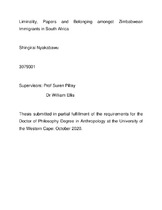| dc.description.abstract | Introduced in 2010, the Dispensation Zimbabwe Program (DZP) regularised undocumented Zimbabwean immigrants in South Africa. When DZP was closed, the Zimbabwe Special Permit was introduced, which was also replaced by the Zimbabwe Exemption Permit. This thesis examines the lived experiences of Zimbabwean migrants from the time they arrived in South Africa without papers, visas, or permits. It then examines the processes of acquiring DZP papers, processes of replacing it, and how conditions on the permits reinforce a particular notion of belonging for Zimbabwean immigrants. I draw on work inspired by the anthropologist Victor Turner’s (1967) concept of liminality to show that Zimbabwean migrants had been going through various phases of uncertain legal statuses which are all liminal. Through accounts of lived experiences and biographical narratives of migrants who see themselves as ‘entrepreneurs’ in Cape Town, I consider how migrant’s experience the structural effects of documentation and having or not having ‘papers’. It starts with a state of “illegality” because of being an undocumented migrant in South Africa. It proceeds to “amnesty” from deportation following the announcement of DZP. It then proceeds to the filling of application forms for legalisation at Home Affairs. The DZP permits make them “liminal citizens” in that they got political citizenship by virtue of being documented, but at the same time, the migrants do not enjoy full citizenship status economically. There is also “legal suspension” as in the period between applications for replacement of the permit with another for example from Zimbabwe Special Permit (ZSP) to Zimbabwe Exemption Permit (ZEP). The imposition of conditions in permits that it will not be renewed or extended throws them into a condition of “temporary conditional legality”. As a result, the liminality experienced is both existential and juridical. Juridical liminality results from uncertain legal status whether the migrant is documented or not. Juridical liminality is inherent in law and immigration policy. Existential liminality is because the uncertain legal status permeates all aspects of Zimbabwean immigrants’ lives and delimits their range of action in different spheres. This includes jobs, transnational capabilities, business, family, housing, and schooling for their children. Most studies on migration do not extend their arguments beyond that permits matter as they see them as giving immediate access to social and economic rights. In this thesis, I do not only examine how a condition of being an undocumented immigrant shapes aspects of immigrants’ lives but I further examine the experiences of living with temporary visas and their impact on their lives and family. Whereas in a rite of passage, the liminal stage is temporary, Zimbabweans in South Africa are living in chronic liminality. In all phases of liminal legality, the thesis demonstrates state power through documents/visas in shaping migrant lives deepening our understanding of immigrant incorporation, exclusion, citizenship and belonging. | en_US |

